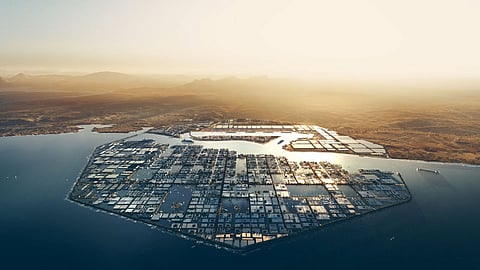

Experts in renewable energy and sustainable development have agreed that NEOM Industrial City – Oxagon – will revolutionize the reliance on renewable energy and zero carbon emissions, making it an important model to be emulated internationally and the focus of attention of investors and international economic institutions.
Head of the Arab Thought Development Forum for Research and researcher in political economy and international relations Abu Bakr Al-Deeb said, in a statement to the Saudi Press Agency (SPA), that Oxagon city is one of the most important giant projects in the Kingdom that reflects its interest in the blue economy by relying on the seas to achieve sustainable development, as well as fighting pollution, which was clearly stated in the "Saudi Green" and the "Middle East Green" initiatives, to help other countries, not just the Kingdom, reduce carbon emissions and double dependence on renewable and clean energy.
Al-Deeb underlined the importance of NEOM Industrial City in attracting large investments to put the Kingdom among major industrial countries, adding that the city will not only revive the Kingdom's economy, but rather the economy of all neighboring countries, including Egypt and Jordan, and the whole Middle East region by large.
He addressed the economic cooperation between the Kingdom and Egypt, citing NEOM's exports through the Suez Canal to the rest of the world and explained that "Oxagon" is distinguished by being adjacent to three continents, which makes the export routes open to transfer goods, as well as crude imports through the Suez Canal, which will benefit the two countries through addressing unemployment and providing thousands of job opportunities for Saudi and Egyptian youths.
Regarding the Kingdom's efforts to reduce carbon emissions in NEOM by relying on renewable energy, Al-Deeb explained that "in light of the exchange of accusations between the major industrial countries that certain countries produce more carbon emissions than others, we did not find solutions on the ground except the efforts of Saudi Arabia and a few other countries, leaving no doubt about the Kingdom's interest and serious desire to rely on renewable energy to reduce carbon emissions".
For his part, the Dean of Applied Research at the Arab Academy for Science, Technology and Maritime Transport Dr. Mohammad Al-Ghamry told SPA that the announcement of the NEOM Industrial City is a result of the Kingdom's pioneering direction to find alternatives to oil in the next 10 years, adding that the Kingdom, through the NEOM industrial city projects, can be a source and exporter of all alternative industries to industries from East Asia via the Suez Canal or the port of Nuweiba.
Al-Ghamry pointed out that the Kingdom and Egypt have an opportunity to establish an industrial strategic alliance in NEOM, eyeing Africa as their export target, which enjoys a custom-free trade exchange and land freight competing with sea freight, meaning that the entire African continent can be a market for the NEOM industrial city.
Meanwhile, the head of the Egyptian Forum for Sustainable Development Dr. Imad El-Din Adly, stressed, in a statement to SPA, the importance of NEOM as a center of attraction for industrial companies, industry leaders, manufacturing pioneers, investors and business owners, due to its harnessing of an airport and an integrated seaport, as well as its role in employing more workers and reducing unemployment, adding that the feasibility of implementing the idea of a blue economy depends primarily on seas and oceans, provided that they are not polluted or badly exploited. Therefore, the establishment of a huge city like NEOM with a distinct strategic location on the Red Sea well establishes the principle of the blue economy as a basic concept, and a role model in achieving sustainable development, he said.
He stressed that the strategic location of NEOM and the potentials that it abounds in addition to its ideal location on the Red Sea, qualifies it to be supportive of the Kingdom in regional trade, in addition to supporting global trade flows in the region.
The Dean of the Institute of Marine Sciences in Suez and Professor of Marine Chemistry Dr. Ahmed Mahmoud Abdel Halim confirmed to SPA that the establishment of a major industrial city, at NEOM, based on the blue economy that depends on the seas, represents a new and innovative idea, noting that there are natural resources that can be extracted from the seas other than fish, such as gas and petroleum, and minerals such as table salt, and sponges from which materials are extracted for medical industries, desalination of seawater, the use of horizontal wave movement and vertical tidal movement in generating electric power and other important resources that can contribute to increasing the domestic income of the Kingdom.
With regards to NEOM's adoption of renewable energy and neutralizing the effects resulting from oil, he said that renewable energy has become a global trend, and therefore there is a need to use renewable and clean energy, which used to be exclusive to solar and wind energy in the past, but in the present there is wave energy, tidal energy and metabolic energy that can be generated from the sea, adding that the Kingdom's efforts to reduce carbon emissions in the industrial city of NEOM by relying on renewable energy is vital and should be replicated in all countries that seek to establish new pollution-free industrial cities.
